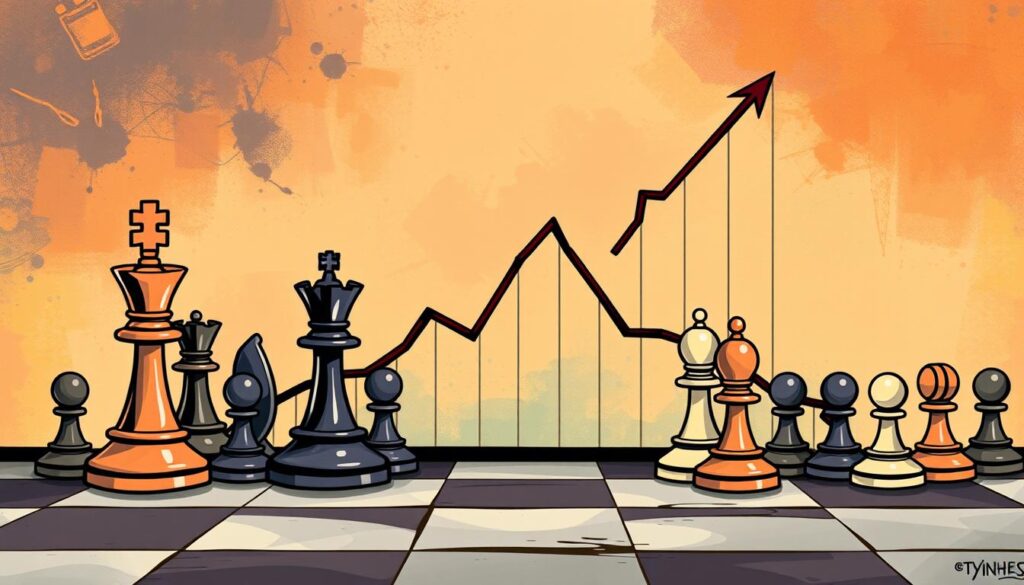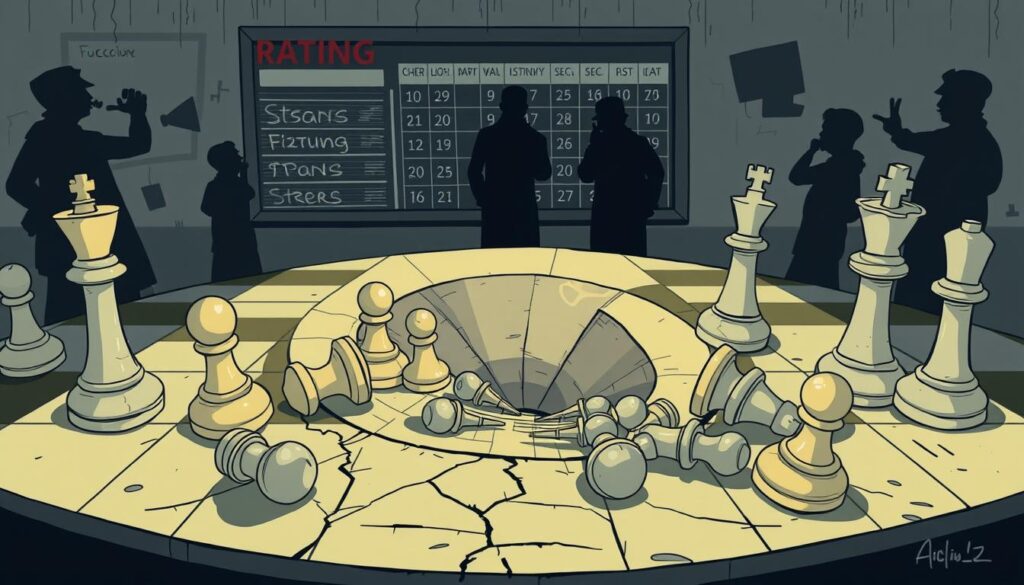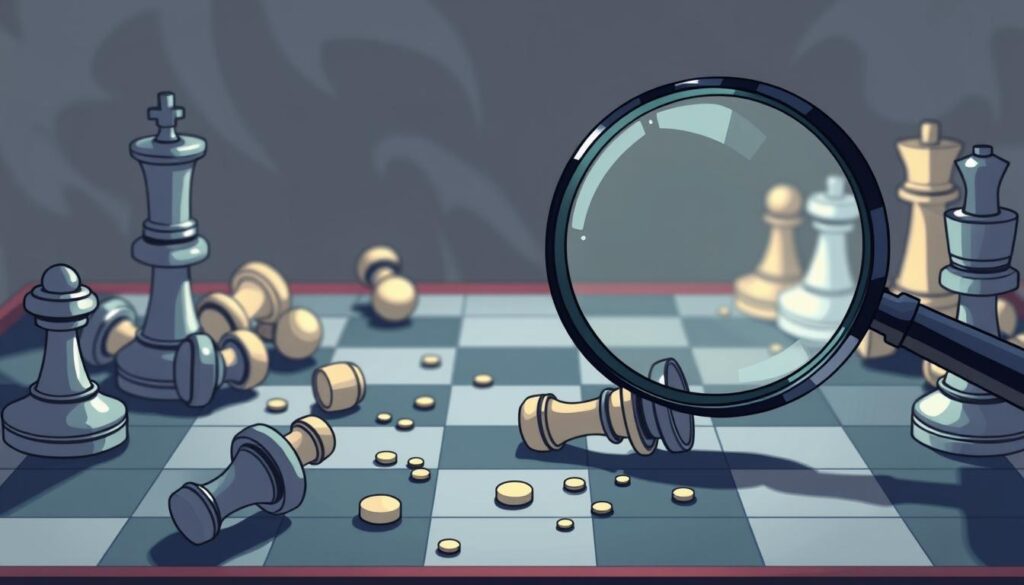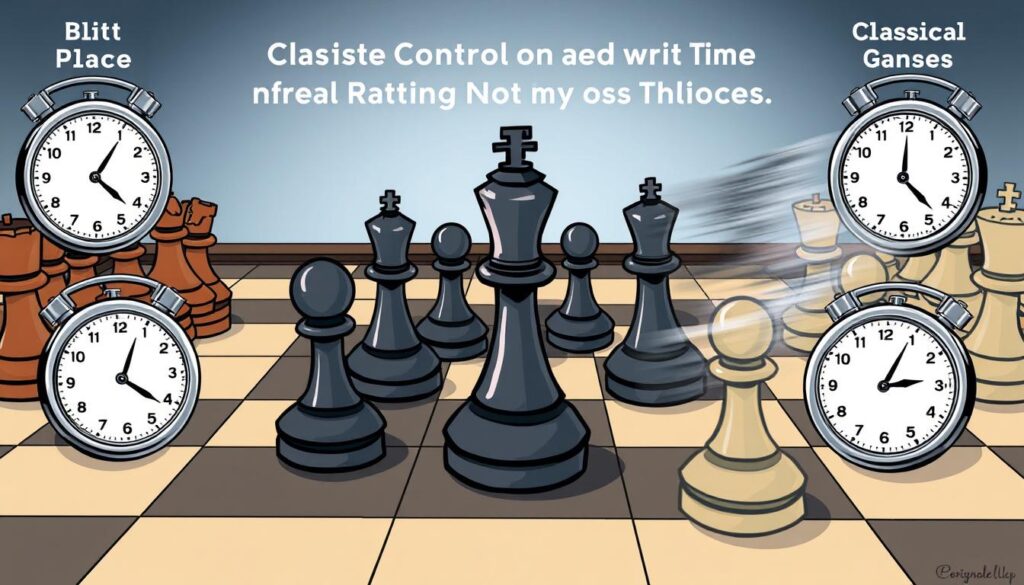Ever felt that sinking feeling when your chess rating decrease? I’ve been there too. Just last month, my rating took a big hit, leaving me feeling frustrated and doubting my chess abilities.
Don’t worry, your chess rating decrease isn’t the end. Ratings can swing between 1450 and 1850. Sometimes, they can even drop by over 600 points. Knowing this can help you see your chess game in a better light.
My rating fell from a comfortable spot to a low point, making me feel down. But I soon realized that these moments are chances to get better. Whether your rating has hit the 800s or you’re seeing ups and downs, there are smart ways to get back on track.
Chess ratings show your skill level, but a drop doesn’t mean you’ve lost your potential. By looking at your games, spotting common mistakes, and using specific strategies, you can regain and even beat your old rating.
Table of Contents
Understanding Why Chess Ratings Fluctuate
Chess ratings are complex systems that track your performance. When you ask why your chess rating decrease, it’s important to understand the reasons. The Elo rating system calculates your skill level based on game outcomes, opponent strength, and statistical probability.

- Performance against opponents of different skill levels
- Frequency and consistency of play
- Time control variations
- Psychological factors during games
Rating calculations depend on complex mathematical models. Here’s a breakdown of rating impact:
| Scenario | Rating Impact |
|---|---|
| Win vs Higher-Rated Opponent | Significant Positive Increase |
| Win vs Lower-Rated Opponent | Small Positive Increase |
| Loss vs Lower-Rated Opponent | Substantial Rating Drop |
| Draw | Minimal Rating Change |
Remember, rating fluctuations are normal in chess. They represent your learning journey and skill development over time.
Different rating ranges reflect player skill levels:
- 600-1000: Beginner
- 1000-1400: Intermediate
- 1400-1800: Advanced Intermediate
- 1800-2200: Advanced
- 2200+: Expert Level
Embracing these rating changes as opportunities for growth can transform your chess experience. It helps you improve consistently.
Common Causes of Chess Rating Decline
When my chess rating keeps dropping, it’s key to find out why. Players often see their ratings fall due to many factors. These factors can change how they play the game.

- Tactical Blunders: Making big mistakes during games
- Strategic Weaknesses: Not planning well for the long game
- Time Management Issues: Not controlling the clock well
- Inconsistent Opening Preparation: Not knowing enough openings
Rating drops can also come from skill gaps. Many players find it hard with complex tactics or endgames. These areas can really hurt their rating.
| Performance Factor | Impact on Rating |
|---|---|
| Tactical Awareness | High (-50 to -200 Elo points) |
| Strategic Understanding | Moderate (-30 to -100 Elo points) |
| Psychological Factors | Significant (-20 to -75 Elo points) |
Psychological issues like anxiety or burnout can also lower your rating. Spotting these issues is the first step to getting better.
Top chess players say it’s vital to train well. They focus on both skills and mental strength. By tackling these common problems, you can turn your rating around and improve your game.
My Chess Rating Dropped: Common Patterns and Solutions

When your chess skill diminished, understanding the patterns behind rating drops becomes crucial. Players often experience fluctuations that can be frustrating and challenging to overcome.
Let’s explore some common rating decline scenarios:
- Consistent Time Control Struggles: Your chess game struggles might be linked to specific time formats. For instance, players often perform differently in rapid versus blitz games.
- Opening Weakness Pattern: Repeated losses in certain opening structures can significantly impact your rating trajectory.
- Psychological Performance Dips: Mental fatigue or emotional responses can trigger unexpected rating drops.
Key diagnostic approaches for understanding your rating decline include:
- Detailed game analysis
- Identifying recurring mistake patterns
- Tracking performance across different time controls
Statistical insights reveal interesting rating dynamics. With a 50-point rating advantage, players have approximately a 58% expected win rate. Understanding these probabilities can help you strategize and rebuild your chess performance.
Your path to rating recovery involves targeted practice, mental resilience, and systematic skill development. By recognizing your specific chess skill diminished patterns, you can create a personalized improvement strategy.
The Impact of Time Controls on Rating Performance

Did your chess ranking drop? Knowing how time controls affect your chess elo is key to getting better. Different time controls bring their own challenges that can change your rating a lot.
Time controls are very important in chess. The speed at which you play changes how you make decisions and the quality of your game. Looking at data from over 90 million Lichess games shows interesting trends about blunders at different time controls.
- Bullet Games (Ultra-Fast):
Higher blunder rates for lower-rated players- 23.3% blunder frequency for players below 1300
- 20.7% blunder frequency for players above 2200
- Slower Time Controls:
More strategic depth, lower blunder rates- 28.2% blunder frequency for players below 1300
- 13.4% blunder frequency for players above 2200
If your lower chess elo worries you, think about these time control insights. Mistakes in fast games can lower chess elo your rating by about 14 points. But, big mistakes in slower games can drop your rating by around 200 points.
To get better, try playing at different time controls. This helps you become more versatile and keeps your rating stable. Remember, being good at one time control doesn’t mean you’ll be good at all.
Mental Health and Chess Performance Connection
When your chess level dropped, understanding the mental health connection becomes crucial. Mental wellness plays a big role in chess performance. It affects your ability to strategize and stay focused during important matches.
Chess players often see rating changes due to psychological factors. Your chess rating decrease when mental stress gets too much. Knowing these psychological patterns can help you find better ways to cope.
- Stress management is key for steady chess performance
- Mental fatigue can cause more mistakes and poor strategies
- Controlling your emotions is important for making good decisions in games
Research shows how mental health affects chess. A study with students found that chess training boosts concentration and cuts down on distractions. For example, students with mild ADHD saw a 41% drop in over-activity through regular chess play.
Professional chess players like Garry Kasparov (IQ 190) talk about the mental challenges of competitive chess. The mental pressure can be very high. This might lead to rating drops and inconsistent performance.
Your mental health toolkit should include:
- Regular breaks during tournaments
- Mindfulness and meditation techniques
- Consistent sleep schedules
- Professional counseling if needed
By focusing on mental wellness, you can build a strong base for chess performance. This might help prevent unexpected rating drops.
Analyzing Your Games: Finding the Root Cause(lower chess elo)
When my chess rating dropped, it’s key to understand why. Game analysis is a powerful tool to find hidden weaknesses. By looking closely at your matches, you can turn a drop in rating into a chance to get better.
Start your analysis with a clear plan:
- Find key moments in each game
- Spot common mistakes in tactics and strategy
- Compare your moves with what engines suggest
- Watch for patterns in how you make decisions
Top chess players suggest using digital tools like chess engines and online databases. These tools offer clear views of your game, showing where you went wrong.
Important analysis methods include:
- Looking at each move’s value
- Checking your understanding of the board
- Examining how you manage time
- Seeing if emotions or psychology played a part
It’s not about dwelling on every mistake. The aim is to learn from them. Viewing your rating drop as a chance to improve can be very helpful.
The Role of Chess Fundamentals in Rating Recovery
When your chess rating decrease, going back to basics is key. Understanding why your rating fell often means you forgot the simple rules of chess.
Chess fundamentals are the key to success. They include:
- Solid opening principles
- Strategic piece development
- Tactical awareness
- Positional understanding
Many players see their ratings drop by ignoring these basics. By focusing on these skills, you can regain confidence and play better.
Key areas to focus on are:
- Pawn Structure Analysis: Learn how pawns help you win
- Piece Coordination: Make sure your pieces work well together
- Tactical Pattern Recognition: Spot common tactics and strategies
Practicing these basics can really help you get your rating back up. Players who work on their skills see big improvements in their game.
| Fundamental Area | Impact on Rating | Recommended Practice |
|---|---|---|
| Opening Principles | 25% Performance Improvement | Daily opening study |
| Tactical Awareness | 35% Mistake Reduction | Solving tactical puzzles |
| Endgame Technique | 40% Winning Probability | Structured endgame training |
Getting your rating back up is a journey. It’s all about learning and practicing every day. Stick to the basics to improve your chess game.
Breaking Bad Chess Habits That lower chess elo
When your chess rating decrease, it’s time to tackle bad habits. Many players face a decline in performance due to habits that hurt their game. Spotting these habits can turn your rating around.
Spotting bad chess habits means looking at yourself honestly. Common problems include:
- Moving too quickly without proper calculation
- Neglecting opponent’s potential threats
- Overextending in seemingly winning positions
- Failing to learn from previous game mistakes
To fight these issues, create a solid chess plan. Begin by thinking carefully before each move. Ask yourself: What threats does my opponent pose? What might happen if I make this move? This slow, thoughtful approach boosts your decision-making.
Here are steps to overcome bad chess habits:
- Record and analyze all your games
- Practice tactical puzzles regularly
- Study grandmaster games
- Work with a chess coach or mentor
Be patient and persistent in breaking bad habits. It takes time and effort to improve your rating and play smarter.
Chess Training Methods for Rating Improvement
When your chess skill diminished, it’s time to get serious about training. Players who struggle in chess need specific methods to regain confidence and boost their game.
Effective chess training includes several key elements:
- Daily tactical puzzle solving
- Systematic game analysis
- Learning from master games
- Focused endgame practice
Online platforms are full of training tools. Chess.com, for example, has over 500,000 puzzles and 100 computer opponents. These tools adjust to your skill level, keeping you challenged and improving.
| Training Method | Time Investment | Potential Rating Improvement |
|---|---|---|
| Tactical Puzzles | 30 minutes daily | 50-100 rating points |
| Game Analysis | 1 hour weekly | 75-125 rating points |
| Master Game Study | 45 minutes daily | 100-150 rating points |
Consistent, focused practice is the secret to beating rating plateaus and improving your chess game.
Managing Playing Schedule and Rest Periods
When your chess ranking fell, finding the right balance is key. Many players see their lower chess elo drop if they don’t manage their play and rest well. This can lead to burnout or a decline in skills.
Creating a good chess playing rhythm needs careful planning. You should aim to avoid mental exhaustion while keeping your skills sharp.
- Limit tournament participation to 2-3 events per month
- Schedule dedicated rest weeks between intensive playing periods
- Use rest periods for strategic study and game analysis
- Implement active recovery techniques like puzzle solving
Rest doesn’t mean you have to stop playing chess. Strategic downtime means doing light training, reviewing games, and getting ready mentally. This helps keep your chess ranking steady while letting your mind rest.
Professional players suggest keeping an eye on your energy and performance. If you feel mentally tired or see your lower chess elo drop, it’s time to change your schedule. Add more rest periods to your routine.
- Monitor your rating trends
- Track mental and physical energy
- Create personalized rest and play cycles
By balancing intense play with well-planned rest, you’ll keep your performance steady. This way, you can avoid sudden drops in your rating.
Setting Realistic Rating Goals and Expectations
When your chess rating decrease, it’s important to keep things in perspective. A drop in rating doesn’t mean you’ve lost all potential. Setting achievable goals helps keep you motivated and improving over time.
Here are some smart ways to handle your rating expectations:
- Focus on improving your skills, not just your rating
- Watch your progress through different measures
- Learn from every game you play
- Set both short-term and long-term goals
Setting realistic goals means understanding that improving at chess takes time. Your rating will change, but regular practice and focused training can help keep it stable and improve it.
Important steps to take when your rating drops:
- Analyze your games carefully
- Find out where you need to get better
- Make a plan to improve specific skills
- Practice with purpose
Remember, even top players have seen their ratings drop. What sets them apart is their strong will and ongoing learning. Your chess journey is about growing, not just about your rating.
Conclusion
When my chess rating keeps dropping, it’s not a defeat. It’s a key part of learning. The FIDE database shows rating changes are common, affecting nearly half a million players. Your rating drop is just a snapshot of your current skill, not your true potential.
Using the strategies from this article can help you deal with rating drops. Players who see their rating drop as a chance to grow do better. In fact, more players are improving, showing that with effort, you can turn things around.
Chess is about fun, growth, and learning. Ratings are just a way to measure how you’re doing. Don’t let them stop you from loving the game. Analyze your games, improve your basics, and stay positive. Every game is a chance to learn, win, lose, or draw.
Enjoy the journey, stay curious, and keep playing. Your chess skills will grow with time, effort, and patience. The most important thing is the joy and understanding you get from each move, not your rating.
FAQ
Why did my chess rating suddenly drop?
Chess ratings can drop for many reasons. This includes playing inconsistently, not preparing well, feeling stressed, or changing how you play. These changes are normal and often come from both technical and mental challenges.
How much rating drop is considered normal in chess?
Small rating changes of 50-100 points are normal. But, drops over 100-150 points might show you need to improve your game. Look at your game closely and work on your weaknesses.
Can I recover my lost chess rating?
Yes, you can! To get your rating back, practice a lot, analyze your games, and work on your weaknesses. Understand your mistakes, improve your basic skills, and stay positive.
Does playing more games help recover my rating?
Playing more games isn’t always the answer. What’s more important is playing well. Focus on improving your skills and understanding your games. This is better than just playing a lot without purpose.
How do different time controls affect my rating?
Time controls like blitz, rapid, and classical chess require different skills. Your performance and rating can change a lot between these formats. Some players do well in one but not others, leading to rating changes.
Should I be worried about my rating drop?
Rating drops are normal for chess players. Instead of worrying, see it as a chance to get better. Many top players have seen their ratings drop before making big improvements.
What are the most common reasons for a chess rating decline?
Rating drops often come from not studying enough, feeling tired, not preparing well for openings, missing tactics, and not knowing the endgame. They can also come from feeling too stressed or burned out. Finding out what’s causing your drop is key to getting better.
How can I prevent future rating drops?
Create a study plan, analyze your games, and work on basic skills. Take care of your mental health, practice regularly, and keep learning. Don’t get too caught up in your rating.
Is it helpful to use chess engines to improve after a rating drop?
Chess engines can help with analysis, but don’t rely on them alone. Use them to learn from your games, but also work on making your own decisions and understanding the game better.
How long does it typically take to recover a lost rating?
How long it takes to get your rating back depends on many things. This includes how hard you work, your dedication, and how big the drop was. Some players see improvements in a few months, while others may take a year or more.
















